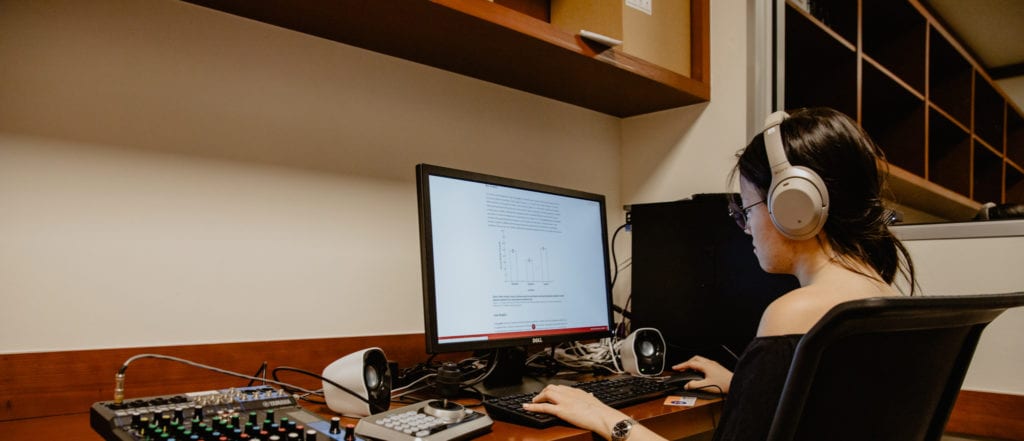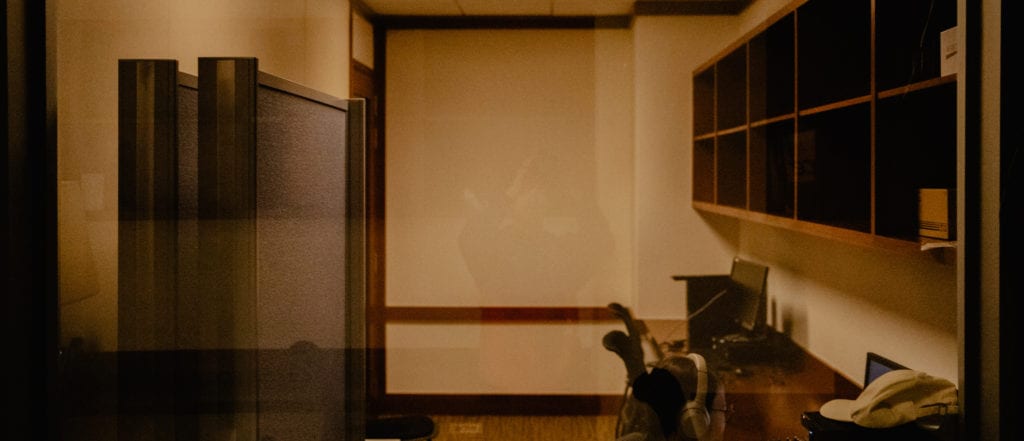Psychology research thrives as Yale-NUS College opens a new Behavioural Lab
 A student using the Library East Core Lab Behavioural Laboratory to run a psychology experiment. The joy stick pad allows her to control the camera in the room behind the two-way mirror, while the sound mixing board allows her to balance and record the audio. Image by Ashbel Chioh for Yale-NUS College.
A student using the Library East Core Lab Behavioural Laboratory to run a psychology experiment. The joy stick pad allows her to control the camera in the room behind the two-way mirror, while the sound mixing board allows her to balance and record the audio. Image by Ashbel Chioh for Yale-NUS College.
Psychology is one of the 14 majors offered in Yale-NUS College, which seeks to answer fundamental questions about human behaviour. Students have the opportunity to learn about a plethora of topics ranging from abnormal psychology, to the origins of bigotry and the psychology of animals.
To boost research capabilities and provide students with hands-on experience in using research tools and software, the College has two behavioural laboratories, which are used by students and faculty members who are conducting experimental psychology, human-computer interaction, or human neuroscience research. Both laboratories are equipped with crucial materials such as a head-mounted eye-tracker, noise-cancelling headphones, vibrotactile rings, and a video camera, to meet different research needs such as observation studies, participant studies and human-computer interaction.
At the start of this academic year, AY2019-2020, a new laboratory, equipped with a two-way mirror, has been set up at the East Core of the College campus to facilitate observation and behavioural studies. This complements the existing laboratory located at Cendana College which was established in 2017. The equipment in the Cendana Behavioural Laboratory consists of several computers, recording systems and a Finapres, which helps monitor blood-pressure in subjects. This set-up caters to single-subject participant studies, small group studies and human-computer interaction.
 The two-way mirror in the observation room in the Library East Core Lab Behavioural Laboratory. Image by Ashbel Chioh for Yale-NUS College.
The two-way mirror in the observation room in the Library East Core Lab Behavioural Laboratory. Image by Ashbel Chioh for Yale-NUS College.
Besides classroom work and learning from case studies, students also embark on their own research, be it areas that faculty are exploring or students’ own areas of interest. Some of the research by Yale-NUS psychology students and faculty members include those in the areas of cognitive science, the psychology of empathy and an observation of parent-child relationships.
According to Keng Shian-Ling, Assistant Professor of Social Sciences (Psychology) and Head of Studies for Psychology, the new Library East Core Behavioural Laboratory was a result of the growing needs of the major. At the Cendana laboratory space, researchers could only run experimental studies involving recording an individual or single subject participants. With the observation room in the new laboratory, observation and behavioural studies can now be conducted for groups as researchers can observe from another room while subjects enter and engage in an activity. This is central to the methodology used by some researchers in developmental research studies, hence providing new possibilities for psychological research on campus.
Prior to the establishment of the laboratories, psychological research was often carried out in classrooms around Yale-NUS. However, Asst Prof Keng said that this was a less than ideal arrangement because of laboratory spaces are very important in the study of psychology. She said, “At Yale-NUS, there’s a lot emphasis on training students and teaching them how to do empirical research. This means they need to have the experience of doing human subject recruitment and running an experimental study. All this is an integral part of psychology training, and the reason why we require students to undertake research methods and statistics courses.”
Psychology students have participated in and set up several interesting studies. Cheong Zi Gi (Class of 2021) and her classmates have used the Cendana Laboratory to set up an Attentional Blink study, which aimed to study the availability of attention across time. She said, “It was useful to learn about such tasks and running pilot tests to fine-tune the specific parameters of the test to fit our experimental needs. Being able to use the psychology labs with standardised screen sizes and an isolated testing environment helped to remove other complicating factors.”
Additionally, students have used the laboratories and specialised software like MTurk and Psychopy to carry out a variety of experiments. For instance, one student used the laboratory’s computers to set up a Stroop Task that involved gauging participants’ reaction times when attempting to identify words despite being given conflicting information. In a similar vein, in the past year, Asst Prof Keng and her students have used the laboratories to run a study that tried to assess the impact of humour on attention spans.
Asst Prof Keng shared that the Psychology major is in the process of acquiring more equipment that will allow students and faculty members to carry out a broader range of research such as psycho-physiological research.





